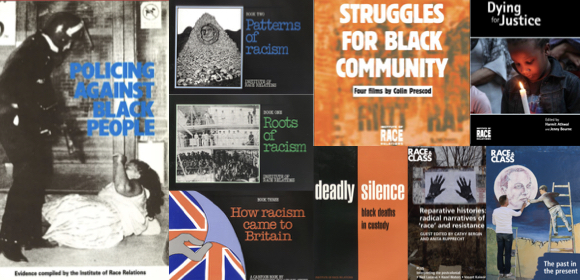The Institute of Race Relations – a radical voice against racism for over forty years – draws attention to its varied resources that give context and specificities to the declaration of Black Lives Matter that, ‘It Happens Here Too.’
Resources on policing and deaths in custody In UK and the US
The IRR was the first organisation to publish comprehensive studies of how black people and other racialised minorities have come to die in the custody of the police, in prisons, mental hospitals and immigration removal centres. The first report to cover police deaths was Policing Against Black People (1979) though its primary focus was police harassment, specialist squads and the SUS laws. Later, the IRR published two publications that dealt specifically with deaths in police custody. Deadly Silence analyses 75 cases between 1969 to 1991. Dying for Justice, which is also available for free download, documents 509 deaths in suspicious circumstances between 1979 and 2014. For a more recent update on BAME, refugee and migrant deaths in custody since September 2014, click here.
Campaigns against police racism over the last forty years have rightly focussed on excessive use of force leading to deaths in custody – but they have also covered issues such as racial profiling, stop and search, use of specialist squads in Black areas, policing of Black protest, failure to protect the community from racist attack and the joint enterprise laws. The IRR and its journal Race & Class have consistently sought to work with scholar-activists who set out to amplify the community voice. Our recent Twitter threads collate a number of Race & Class and IRR News pieces that deal with police racism and the carceral state in the UK and the US (in Detroit and Ferguson for instance) written by authors such as Angela Davis, Stafford Scott, A. Sivanandan, Arun Kundnani, Micol Seigal, Lee Bridges and Liz Fekete.
Watch IRR director Liz Fekete discussing the current situation in the US at a recent Global Justice Now seminar with Abdul Alkhalimat and Walden Bello.
Reparative history resources and anti-racist educational materials
The current wave of protests has thrown up the urgent need for an overhaul of the curriculum and a reappraisal of British Empire. Two previous issues of Race & Class, The past in the present (July 2018) and Reparative histories: radical narratives of “race” and resistance (January 2016) look racism and empire in the eye! These issues and other articles deal with ‘Reparative History, race and resistance’, and include contributions from, amongst others, Cathy Burgin, Anita Rupprecht, Catherine Hall, John Newsinger and Priyamavada Gopal. See our recent Twitter thread for the full list of articles.
For 90 days free access to Race & Class click here
The IRR also has a record that goes back to 1985 of producing anti-racist educational materials for schools on Britain’s participation in the roots and international development of patterns of racism. From its pioneering pamphlets on the Roots of Racism and Patterns of Racism (1985) to its cartoon book on How Racism Came to Britain; from Black film director Colin Prescod’s innovative films on Struggles for Black Community in Cardiff, Leicester, Southall and Notting Hill, to local studies of Black, and Asian resistance in Southall and Newham.
To access the full range of anti-racist educational materials published by the IRR click here

